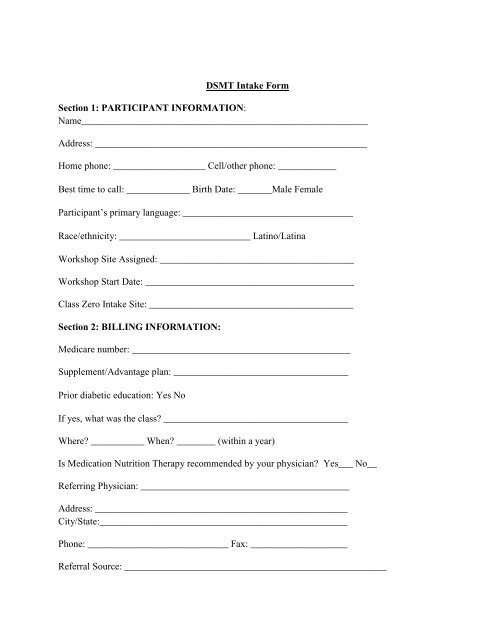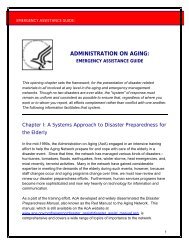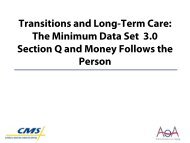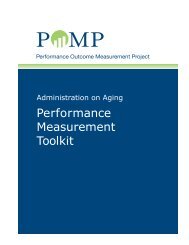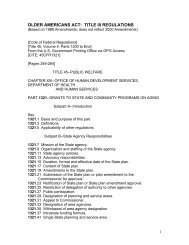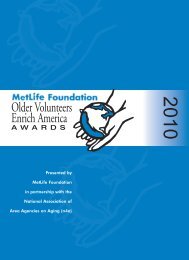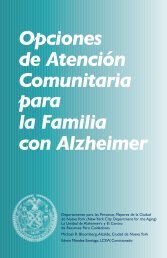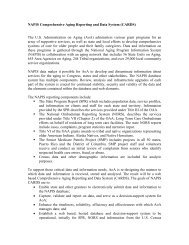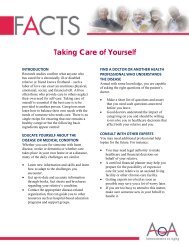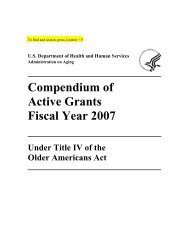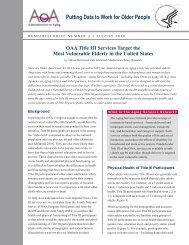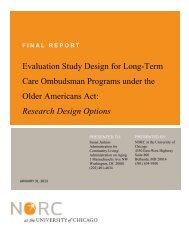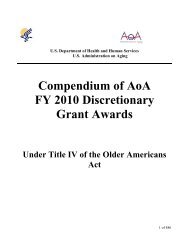DSMT Intake Form Section 1: PARTICIPANT INFORMATION ...
DSMT Intake Form Section 1: PARTICIPANT INFORMATION ...
DSMT Intake Form Section 1: PARTICIPANT INFORMATION ...
Create successful ePaper yourself
Turn your PDF publications into a flip-book with our unique Google optimized e-Paper software.
<strong>DSMT</strong> <strong>Intake</strong> <strong>Form</strong><br />
<strong>Section</strong> 1: <strong>PARTICIPANT</strong> <strong>INFORMATION</strong>:<br />
Name___________________________________________________________<br />
Address: ________________________________________________________<br />
Home phone: ___________________ Cell/other phone: ____________<br />
Best time to call: _____________ Birth Date: _______Male Female <br />
Participant’s primary language: ___________________________________<br />
Race/ethnicity: ___________________________ Latino/Latina <br />
Workshop Site Assigned: ________________________________________<br />
Workshop Start Date: ___________________________________________<br />
Class Zero <strong>Intake</strong> Site: __________________________________________<br />
<strong>Section</strong> 2: BILLING <strong>INFORMATION</strong>:<br />
Medicare number: _____________________________________________<br />
Supplement/Advantage plan: ____________________________________<br />
Prior diabetic education: Yes No <br />
If yes, what was the class? ______________________________________<br />
Where? ___________ When? ________ (within a year)<br />
Is Medication Nutrition Therapy recommended by your physician? Yes___ No__<br />
Referring Physician: ___________________________________________<br />
Address: ____________________________________________________<br />
City/State:___________________________________________________<br />
Phone: _____________________________ Fax: ____________________<br />
Referral Source: ______________________________________________________
<strong>Section</strong> 3: MEDICAL <strong>INFORMATION</strong>:<br />
Type of Diabetes_______<br />
Age____ Ht_____ Wt_____ BMI___<br />
Most Recent Fasting Blood Glucose (date/result): _____________________<br />
Most Recent HgbA1c, if available (date/result):_______________________<br />
Most Recent LDL-C, if available (date/result): _______________________<br />
1. Are you taking oral medications to treat your diabetes? Yes No <br />
Have you ever taken oral medication to treat your diabetes? Yes No <br />
Name(s) of medication and dosage(s): ____________________________________<br />
2. Are you currently taking insulin to control your diabetes? Yes No <br />
Have you ever taken insulin to control your diabetes? Yes No <br />
Name(s) of medication and dosage(s): ____________________________________<br />
3. Have you taken any steroids such as prednisone which impacted your diabetes? Yes No<br />
How did it impact your diabetes?_________________________________<br />
4. How often do you measure your blood sugar level? <br />
Never Rarely 1-3 times per month 1 – 3 times per week;<br />
4 – 6 times per week 1-2 times per day 3+ times per day <br />
If you keep a log of your blood sugar level what is your usually range? _______<br />
5. How often are you physically active (e.g., walking, exercise?) <br />
Never Rarely 1–3 times per month Once a week,<br />
Two or more times per week<br />
Daily<br />
Please share examples of the types of physically activity<br />
_______________________________________________________________
6. Do you follow a specific meal plan? Yes No <br />
If yes, what is your meal plan?<br />
______________________________________________________________________________<br />
__________________________________________________<br />
7. Do you use tobacco? Yes___ No___<br />
If yes, what type? Cigarettes_____ Chew____ Snuff___ Pipe____ Cigar____<br />
If you stopped smoking, when was your last use?_______<br />
8. Do you have pain from your diabetes or any other condition? Yes__No__<br />
If yes, describe how this affects you_____________________________________<br />
9. Have you been in the emergency room or hospitalized for a condition related to your diabetes<br />
in the last 12 months? Yes No<br />
Details:<br />
______________________________________________________________________________<br />
__________________________________________________<br />
8. Have you had your eyes checked by a specialist in the last 12 months? Yes No<br />
Results: ________________________________________________<br />
9. Have you had a foot examination in the last 12 months? Yes No<br />
Results: ____________________________________________________<br />
10. Do you have high blood pressure? Yes No <br />
Name(s) of medication and dosage(s):<br />
______________________________________________________________________________<br />
__________________________________________________<br />
11. Do you have pain from your diabetes or any other condition? <br />
If yes, please briefly describe how this affects you: _______________________________
<strong>Section</strong> 4 - SOCIAL FACTORS<br />
Family Environment and Support:<br />
1. Do you live alone? Yes If no how many people live with you ___________<br />
2. Are there relatives or others caring helping you on a regular basis? Yes No<br />
3. Do you prepare your own meals? Yes If no, who prepares them for you?<br />
__________________________________________________________<br />
4. Do you have support from family or others to deal with your diabetes? Yes No<br />
5. Other psychosocial factors impacting diabetes management<br />
________________________________________________<br />
Cultural Factors:<br />
1. Is there anything specific to your culture that you think influences your ability to manage your<br />
diabetes?<br />
________________________________________________________________________<br />
______________________________________________<br />
2. “Do your cultural beliefs influence your ability to manage your diabetes?”<br />
________________________________________________________________________<br />
______________________________________________<br />
3. Are there certain types of foods important to your culture?<br />
____________________________________________________________<br />
____________________________________________________________<br />
4. Does having diabetes or having a serious illness create culture stress?<br />
________________________________________________________________________<br />
______________________________________________<br />
5. Are there any religious or cultural factors that affect how you eat?<br />
________________________________________________________________________<br />
________________________________________________________________________<br />
______________________________________________________
6. Emotional symptoms associated with diabetes (stress, anxiety, depression): “How do you feel<br />
about having diabetes? <br />
Okay Anxious Angry <br />
Afraid Sad Depressed<br />
Overwhelmed “Unsure of what to do, alone” <br />
Additional Comments<br />
______________________________________________________________________________<br />
______________________________________________________________________________<br />
____________________________________<br />
Other cultural factors that impact the management of diabetes____________________<br />
<strong>Section</strong> 5 -- Individual Educational Plan:<br />
Paraphrase: The Take Charge of Your Diabetes workshop meets for 6 weeks range of topics.<br />
Participants learn in the workshop to work on their own goals related to managing their diabetes.<br />
Now, we’re going to create an individual educational plan for you so that you can get the most<br />
out of the workshop.<br />
1. Would you like help with any of the following things (Check as many as applicable?)<br />
___ Eating healthier meals/following a healthier meal pattern<br />
___ Increase my level of physical activity/exercise<br />
___ Increase my monitoring of blood sugar<br />
___ Increase the support from family or friends<br />
___ Set an achievable weight lose goals<br />
___ Increase my understanding of diabetes<br />
___ Improve my ability to manage stress and/or emotions that effect my diabetes<br />
___ Improve my ability to manage my depression<br />
___ Increase my ability to work with complications from diabetes (such as<br />
medical issues like neuropathy, vision problems, low energy, mobility<br />
problems)
___ Increase my ability to use the medical system effectively (for example: better<br />
communication with doctors)<br />
___ Increase my ability to give myself injections at appropriate/regular time<br />
2. Identify the top three problems or issues which impact your ability to managing your diabetes:<br />
(for example, blood sugar fluctuations; poor diet; depression; or other factors)<br />
________________________________________________________________________<br />
________________________________________________________________________<br />
________________________________________________________________________<br />
3. Identify barriers to managing your diabetes successfully: (physical barriers; language; literacy;<br />
appropriateness for self-management<br />
_______________________________________________________________<br />
<br />
INDIVIDUAL PROBLEMS/NEEDS/GOALS: <br />
4. Participant’s readiness for change (Pre-contemplative; contemplative; preparation; action;<br />
maintenance; relapse)<br />
Participant’s initial goals:<br />
________________________________________________________________________<br />
________________________________________________________________________<br />
________________________________________________________________________<br />
________________________________________________________________________<br />
________________________________________________________________________<br />
<br />
ACCOMMODATION FOR <strong>PARTICIPANT</strong>’S INDIVIDUAL EDUCATIONAL<br />
NEEDS: <br />
Visual/Learning/Mobility/other disability that needs an accommodation:<br />
___________________________________________________________<br />
Summary of Plan<br />
____________________________________________________________________________<br />
____________________________________________________________________________<br />
Instructor’s Signature_(RN, RD, PharmD, RPh)______________<br />
Date______________
<strong>Section</strong> 5: Individual and Collaborative Education Plan<br />
Introduction: The [Fill in Name of Workshop] Diabetes workshop will meet for 6<br />
weeks and cover a range of topics. Participants will learn about nutrition,<br />
exercise, managing stress, communicating with health professionals, managing<br />
blood glucose, and skills for gal setting and problem solving. Participants<br />
typically use the workshop to work on their own goals related to managing their<br />
diabetes.<br />
If participant is appropriate for and willing to attend the workshop, PQI adds:<br />
Now were' going to create an individual education plan for you so that you can<br />
get the most out of the workshop.<br />
1. Would you like help with any of the following things? (Circle as many as applicable)<br />
a. Eating healthier meals / following a healthier meal pattern<br />
b. Increasing / being consistent with exercise<br />
c. Increasing monitoring of blood sugar<br />
d. Giving injections at appropriate I regular times<br />
e. Managing medication usage<br />
f. Increasing support from family and friends<br />
g. Losing weight<br />
h. Understanding more about diabetes<br />
i. Working with stress and/or other difficult emotions from diabetes<br />
j. Working with complications from diabetes (medical issues such as<br />
neuropathy, vision, low energy, foot, mobility)<br />
k. Using the medical system with more success and effectiveness<br />
I. Improving Communication Skills<br />
2. Participant's current problems or issues with managing diabetes: (blood<br />
sugar fluctuations, poor diet, depression, other complications<br />
3. Barriers to learning I coping successfully with diabetes (physical barriers,<br />
language, literacy, appropriateness for self-management):
Individual Problems/ Need/ Goals:<br />
Participant initial goals:<br />
Participant readiness for change (Pre-contemplative, contemplative, preparation, action,<br />
maintenance, relapse):<br />
Accommodations for Participant's Individual Education Needs: (language, visual, learning, mobility,<br />
other):<br />
Summary of Plan:<br />
PQI Signature: -------------------


